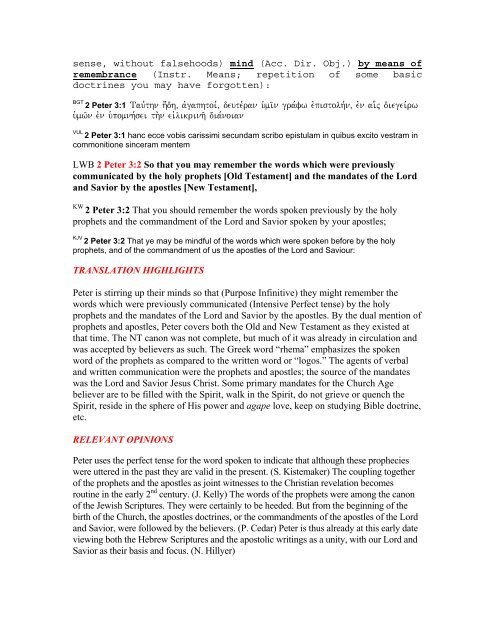2 Peter - Verse-by-Verse Biblical Exegesis
2 Peter - Verse-by-Verse Biblical Exegesis
2 Peter - Verse-by-Verse Biblical Exegesis
Create successful ePaper yourself
Turn your PDF publications into a flip-book with our unique Google optimized e-Paper software.
sense, without falsehoods) mind (Acc. Dir. Obj.) <strong>by</strong> means of<br />
remembrance (Instr. Means; repetition of some basic<br />
doctrines you may have forgotten):<br />
BGT 2 <strong>Peter</strong> 3:1 Tau,thn h;dh( avgaphtoi,( deute,ran u`mi/n gra,fw evpistolh,n( evn ai-j diegei,rw<br />
u`mw/n evn u`pomnh,sei th.n eivlikrinh/ dia,noian<br />
VUL<br />
2 <strong>Peter</strong> 3:1 hanc ecce vobis carissimi secundam scribo epistulam in quibus excito vestram in<br />
commonitione sinceram mentem<br />
LWB 2 <strong>Peter</strong> 3:2 So that you may remember the words which were previously<br />
communicated <strong>by</strong> the holy prophets [Old Testament] and the mandates of the Lord<br />
and Savior <strong>by</strong> the apostles [New Testament],<br />
KW 2 <strong>Peter</strong> 3:2 That you should remember the words spoken previously <strong>by</strong> the holy<br />
prophets and the commandment of the Lord and Savior spoken <strong>by</strong> your apostles;<br />
KJV 2 <strong>Peter</strong> 3:2 That ye may be mindful of the words which were spoken before <strong>by</strong> the holy<br />
prophets, and of the commandment of us the apostles of the Lord and Saviour:<br />
TRANSLATION HIGHLIGHTS<br />
<strong>Peter</strong> is stirring up their minds so that (Purpose Infinitive) they might remember the<br />
words which were previously communicated (Intensive Perfect tense) <strong>by</strong> the holy<br />
prophets and the mandates of the Lord and Savior <strong>by</strong> the apostles. By the dual mention of<br />
prophets and apostles, <strong>Peter</strong> covers both the Old and New Testament as they existed at<br />
that time. The NT canon was not complete, but much of it was already in circulation and<br />
was accepted <strong>by</strong> believers as such. The Greek word “rhema” emphasizes the spoken<br />
word of the prophets as compared to the written word or “logos.” The agents of verbal<br />
and written communication were the prophets and apostles; the source of the mandates<br />
was the Lord and Savior Jesus Christ. Some primary mandates for the Church Age<br />
believer are to be filled with the Spirit, walk in the Spirit, do not grieve or quench the<br />
Spirit, reside in the sphere of His power and agape love, keep on studying Bible doctrine,<br />
etc.<br />
RELEVANT OPINIONS<br />
<strong>Peter</strong> uses the perfect tense for the word spoken to indicate that although these prophecies<br />
were uttered in the past they are valid in the present. (S. Kistemaker) The coupling together<br />
of the prophets and the apostles as joint witnesses to the Christian revelation becomes<br />
routine in the early 2 nd century. (J. Kelly) The words of the prophets were among the canon<br />
of the Jewish Scriptures. They were certainly to be heeded. But from the beginning of the<br />
birth of the Church, the apostles doctrines, or the commandments of the apostles of the Lord<br />
and Savior, were followed <strong>by</strong> the believers. (P. Cedar) <strong>Peter</strong> is thus already at this early date<br />
viewing both the Hebrew Scriptures and the apostolic writings as a unity, with our Lord and<br />
Savior as their basis and focus. (N. Hillyer)









